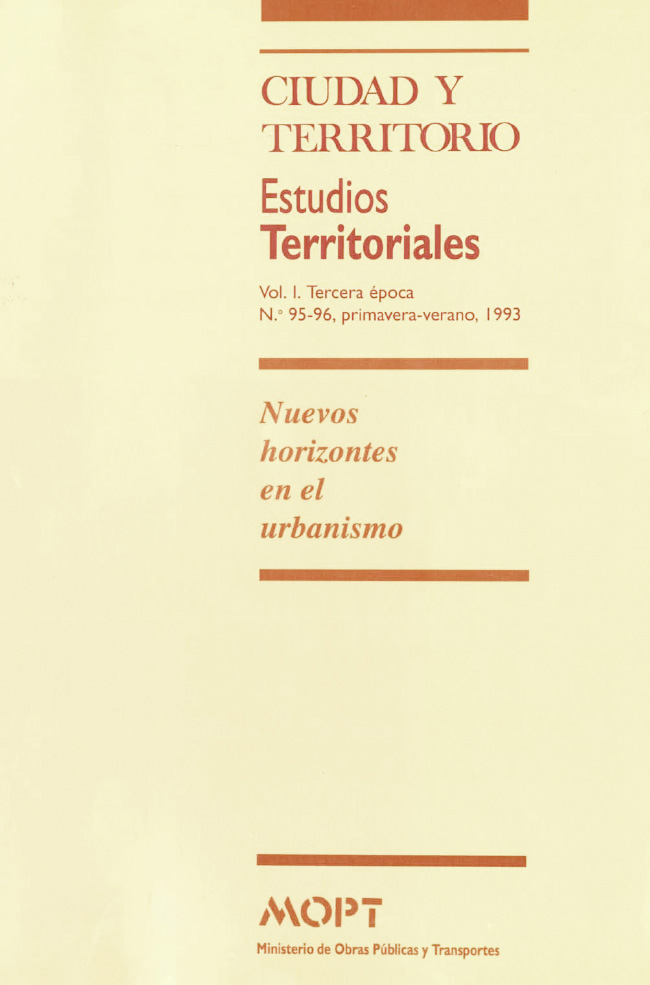Of town and country cultures: challenges to planning in the twenty-first century
Abstract
The paper opens by the Eighties as having given Spain in the town planning field, a valuable new Urban Culture that bettered by far the previous period's "plans for devolopment" pretensions. It then points out that the above notwithstanding, this new planning is marked by clear rejection of the metropolitan fact and a distaste for any seeing of the regional framework as a point of reference for a system of cities, or its being the grounds from which the structures and functions within these might be understood. Be this as it may, the period, though brief, is seen to have been a brilliant one and intimately knit with those aspirations as to things social born of the coming in of the new democratic town and city administrations. It then goes on to insist that the Country needs to make its own a New Culture as to Town and Country Matters which would go beyond any narrow parochialisms when it came to deal with both the pinning down of problems or the perception of opportunities for planning action. The principle features of such a culture are here seen to be: 1, Town and Country Planning to serve the ends of Social and Economic Development; 2, A new ethical approach to Ecological Concerns; 3, A bringing together of Local and Overall Planning; 4, An upgrading of the importance of Minor Scale Planning; 5, Limits upon merely Local Planning's Pretensions; 6, A Leading rôle for a System of Cities; 7, A Special Attention upon Medium Scale Planning in terms of the Functional Requirements of the Area in Question; 8, The Territory to be taken as the Framework within which a Collective Will to change is beat to be expressed; 9, Close Link-ups as between Planning Activity and General Overall Economic Planning for Devolopment. The paper then holds that were there to be an adequate answer to the future needs and ambitions of Spanis Society on the part of Town and Countr y Planning, ther would needs must be a workable legal framework that would allow for the drawing up of such mechanisms proper to imaginatively administrating the concrete putting into effect of these. Were this realistic making possible of an imaginative handling of the situation to founder, then much that many dreamt would go down in a sea of inoperancy and bureaucratic trammels.
Downloads
Downloads
Published
How to Cite
Issue
Section
License
Copyright (c) 1993 Alfonso Vegara Gómez

This work is licensed under a Creative Commons Attribution-NonCommercial-NoDerivatives 4.0 International License.
Considering the provisions of the current legislation on Intellectual Property, and in accordance with them, all authors publishing in CyTET give -in a non-exclusive way and without time limit- to the Ministry of Transport, Mobility and Urban Agenda the rights to disseminate, reproduce, communicate and distribute in any current or future format, on paper or electronic, the original or derived version of their work under a Creative Commons Attribution-NonCommercial-NoDerivative 4.0 license International (CC BY-NC-ND 4.0), as well as to include or assign to third parties the inclusion of its content in national and international indexes, repositories and databases, with reference and recognition in any case of its authorship.
In addition, when sending the work, the author(s) declares that it is an original work in which the sources that have been used are recognized, committing to respect the scientific evidence, to no longer modify the original data and to verify or refute its hypothesis. Author(s) also declare that the essential content of the work has not been previously published nor will it be published in any other publication while it is under evaluation by CyTET; and that it has not been simultaneously sent to another journal.
Authors must sign a Transfer of Rights Form, which will be sent to them from the CyTET Secretariat once the article is accepted for publication.
With the aim of promoting the dissemination of knowledge, CyTET joins the Open Journal Access (OA) movement and delivers all of its content to various national and international indexes, repositories and databases under this protocol; therefore, the submission of a work to be published in the journal presupposes the explicit acceptance by the author of this distribution method.
Authors are encouraged to reproduce and host their work published in CyTET in institutional repositories, web pages, etc. with the intention of contributing to the improvement of the transfer of knowledge and the citation of said works.








 Enlace a CyTET en Linkedin
Enlace a CyTET en Linkedin